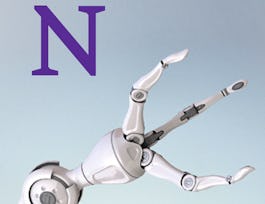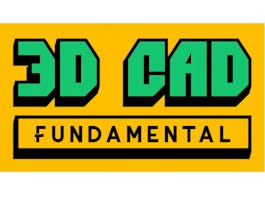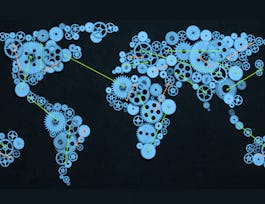- Explore
- Physical Science and Engineering
- Mechanical Engineering
Mechanical Engineering
Earn Your Degree
Most Popular Courses
More Mechanical Engineering Courses
Top Rated Courses
Learn to Create Drawings and Prototypes Using CAD
Reimagine Manufacturing with Digital Manufacturing and CAD
Most Popular Certificates
Frequently Asked Questions about Mechanical Engineering
Mechanical engineers are responsible for the design, manufacture, and proper maintenance of machines and mechanical systems. A machine is defined by the Oxford Dictionary as “any device that transmits a force or directs its application,” but a less technical definition is that machines are simply anything that moves or has moving parts. When you consider just how much of our fast-moving world is dependent on these machines, broadly defined, it’s no wonder that this subfield of engineering has been critically important to society since the dawn of the Industrial Age.
Technology has come a long way since the earliest steam engines, of course. Today, mechanical engineers are creating incredibly complex machines to do work across a growing and diverse range of fields, from perennially important industries such as automotive and manufacturing to emerging high-tech areas like aeronautics, biotechnology, and robotics. Mechanical engineering is also shrinking in scale, designing microelectromechanical and even nanoelectromechanical devices and systems that may be invisible to us but are increasingly important to the latest technologies.
Regardless of the scale of the machines in question, the field of mechanical engineering requires core skills across several areas, including calculus, physics, fluid dynamics, thermodynamics, and more. This background, along with much more specialized knowledge in subject-specific areas, enables mechanical engineers to analyze the physical and environmental forces a machine will encounter during operation and then create designs to enable it to perform its function reliably.
If you are fascinated by how things work and want to build the useful machines of the future yourself, a background in mechanical engineering can be a gateway to an interesting and rewarding career. It also allows you to work in a wide range of industries, as technology creates possibilities for new and innovative solutions to problems in a growing range of areas.
For example, mechanical engineers may work in building services, designing elevator and escalator systems for residential and commercial spaces, conveyor belts and other materials transportation systems for factories, or environmental control systems in more specialized roles as heating and cooling systems engineers. Auto research engineers study ways to improve the fuel efficiency and performance of cars, through new types of suspensions and transmissions, more aerodynamic designs, and new fuels such as biofuels blends, electricity, and hydrogen. And the growing field of biomedical engineering is producing novel devices to address health issues, including nanoscale devices small enough to travel through blood vessels.
According to the Bureau of Labor Statistics, mechanical engineering jobs typically require a bachelor’s degree, and mechanical engineers that sell services to the public must be licensed accordingly. These roles also generally pay well, with a median annual wage of $87,370. However, this median wage can vary significantly depending on what type of work you do; machinery manufacturing roles have a median annual wage of $80,310, while, at the high end, roles in scientific research and development services have a median annual wage of $99,870.
While mechanical engineering may sound like a field that requires hands-on learning, in practice it requires a deep background in theoretical foundations like calculus, physics, thermodynamics, fluid mechanics, and material science. Online courses are available on Coursera to help you build your background in the prerequisites of mechanical engineering as well as in more specialized subjects such as robotics, manufacturing, system design, and quantum mechanics.
The Coursera platform offers students the opportunity to learn mechanical engineering from top-ranked institutions like the Georgia Institute of Technology, University of Pennsylvania, and the University of Minnesota. And the ability to learn on a flexible schedule and at a lower cost than on-campus alternatives can help you fit online learning courses into your schedule as well as your budget - all without sacrificing the quality of your education.
Mechanical engineering courses on Coursera cover a broad array of topics essential to the discipline:
- Basics of mechanics, including statics, dynamics, and strength of materials.
- Principles of thermodynamics and heat transfer and their applications in various systems.
- Design and analysis of mechanical systems and components, such as engines, machines, and tools.
- Introduction to manufacturing processes and the technologies used in production.
- Computer-aided design (CAD) and computer-aided engineering (CAE) techniques.
- Fluid mechanics and its applications in hydraulic and pneumatic systems.
- Concepts in advanced materials science and engineering properties of materials.
Mechanical engineering courses on Coursera are designed to accommodate learners at different stages of their education and career:
- Introductory courses provide a comprehensive overview for those new to the field, covering fundamental concepts and basic applications.
- Intermediate courses are available for learners with some mechanical engineering background, focusing on more detailed aspects of the discipline.
- Advanced courses cater to experienced learners who seek to deepen their expertise in specialized areas of mechanical engineering.
Coursera offers a variety of educational credentials in partnership with accredited institutions:
- Professional certificates that can help establish or enhance your skills in mechanical engineering.
- Specialized course certificates that demonstrate proficiency in specific mechanical engineering topics.
- Degree programs and advanced qualifications that can help prepare you for leadership roles or specialized positions in the field.
These credentials are intended to support your career development by helping provide evidence of your knowledge and skills.
Skills gained through mechanical engineering courses on Coursera can lead to diverse and dynamic career opportunities across industries:
- Mechanical Engineer: Design, analyze, and manufacture new products and machinery.
- Automotive Engineer: Develop new technologies and systems for automotive design and manufacturing.
- Aerospace Engineer: Design and test aircraft, spacecraft, and missiles.
- Robotics Engineer: Create robots and robotic systems that can perform tasks typically done by humans.
- Project Engineer: Manage engineering projects from concept through completion, ensuring they meet technical standards and constraints.
Online Mechanical Engineering courses offer a convenient and flexible way to enhance your existing knowledge or learn new Mechanical Engineering skills. With a wide range of Mechanical Engineering classes, you can conveniently learn at your own pace to advance your Mechanical Engineering career.
When looking to enhance your workforce's skills in Mechanical Engineering, it's crucial to select a course that aligns with their current abilities and learning objectives. Our Skills Dashboard is an invaluable tool for identifying skill gaps and choosing the most appropriate course for effective upskilling. For a comprehensive understanding of how our courses can benefit your employees, explore the enterprise solutions we offer. Discover more about our tailored programs at Coursera for Business here.


































































